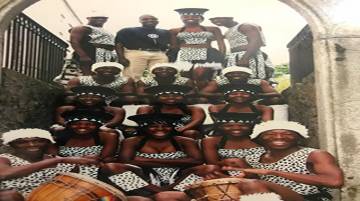
The Sunday News

Bruce Ndlovu, Sunday Life Correspondent
“ONE thing that I believe that Iyasa has done is to take away a lot of my personal life,” says Nkululeko Dube, the founder and director of legendary arts ensemble, Inkululeko Yabatsha School of Arts (Iyasa).
“I’ve lost people I love so as to sacrifice for this brand and I’ve lost people that were important to me so as to sacrifice for this brand.”
It is two days after the group celebrated two decades in the arts industry with yet another scintillating show and Dube is going down memory lane, trying to retrace the footsteps, trying to weigh every drop of blood and sweat that made that celebration at the Bulawayo Theatre on New Year’s Day possible.
On stage Iyasa is flawless. The dances are perfectly sequenced, the bodies of the performers move with that strange athletic grace of those that have spent hours in training, horning their craft. Simply put, when the curtain rises and the drums start ringing out loud, Iyasa is perfect. It would be easy to think that the lives of those that move with such skill on stage are as well choreographed off it.

During a visit to Sunday Life’s offices on an evening in which heavy cloud cover had draped itself around Bulawayo as if in warning of the storms that the usually harsh month of January is sure to bring, Dube wants to make it clear that life does not, off stage, follow any neat script.
“I always meet people who say I want to be like you or I want to travel like you. I talk to a lot of young people and give lectures at university and colleges and all of them think that because we travel a lot and we are away from home then this is life. Yet it is life but it’s not the ultimate way of life. You lose a part of yourself,” he says.
For Dube, sacrifice for Iyasa has taken a great personal toll and although he does not delve deep into the subject, he admits that he has lost someone dear to his heart because his dedication to the group that sparked a dance revolution in the City of Kings.

IYASA at the turn of the millennium
“Like I said I lost a person I loved because of Iyasa and it was inevitable. But I also found myself after that. Public life is not easy and it will break you. There were moments when I was broken. I always tell people that want to come into public life that there’s a price for it. I have two sons now and perhaps instead I could have had seven. But because of the career that I chose you’ve got to be a father to those young people that look up to you,” he says.
After two decades Dube remembers how this incredible journey, a journey that has brought a lot of joy and a fair bit of hardship in his personal life, began.
“What happened was that when I graduated as a teacher, I was deployed to Mpopoma High School. What I did there was to work with an existing group, which was the Mpopoma Drama Club.
“Because of my enthusiasm and because I already had a history in theatre from Umzingwane High School and because I had always been inspired by people like Mbongeni Ngema and Amakhosi and I had actually worked with them on different platforms like Umkhosi Wabatsha, it was something that was already in my blood,” Dube says.
Like a lot of great things, the making of Nkululeko Dube the arts administrator happened by accident, as what began as a hobby for him and his first illustrious recruits turned into a full time job.
“Honestly I never thought I would ever find myself in a position where I would be thrown into the position of being an arts director or administrator. At Mpopoma I met the likes of Sandra Ndebele, Romeo Sibanda and Future Sibanda. These were basically the first guys.
When I got there people were doing what I would call normal theatre which was basically drama. I had always been inspired by the art of Ngema where he basically used music, like Sarafina, to portray his art.
“So I had always thought that in Zimbabwe we needed to appeal to people using music and dance. So we focused on what I call musical theatre and our first production as a drama club was called Just Because I’m a Girl, which was a play that told the story of what we were trying to do. It was a very popular play and we brought in parents to see it and suddenly they started to symphathise,” he says.
Dube speaks fondly about those days at Mpopoma where both teacher and students were finding and fumbling their way through the arts.
The question many would ask is how a group of unknown students made their way out of the classrooms of Mpopoma into some of the most illustrious stages in the country and the world.
“We then got an idea of doing a song Woza Mafohloza by Mbongeni Ngema. That song was one of the first times that the public saw us. It was followed by Bum Jive which was our own recording and became quite popular. What it meant was that these young people, while they were still at school, became a public phenomenon. We had people coming to the school to ask these school kids to perform at their functions and weddings.
“So after we did a play on the Unity Accord that was signed in 1987, the whole country began to take notice. We were taking the play around the country, around boarding schools and at some point we didn’t know what to do with ourselves. Even the school authorities were worried that the drama club was just too busy for young people that were at school,” Dube says.
One opportunity gave birth to another and after an invitation to the United States of America, the group found itself on stage in the capital prior to that trip. It was after a performance of the colourful Welcome to Africa, a dance piece showcasing various dances from around the country, that the group met Stephan Rubble, a man that was to be their ticket overseas.
The backstage encounter between Dube and Rubble led to an invitation to the Shakespeare Festival in Austria. But there was a catch: the festival was in 2002 but most of the group members were about to finish their studies at Mpopoma at the end of 2001. That problem would lead to the accidental birth of Iyasa.
“The complication was that most of the artistes were going to be leaving Mpopoma that year. It was also the year I had to leave Mpopoma for Northlea. So it was going to be difficult for me to be working with students from Mpopoma while I was at Northlea. Honestly the drive to form Iyasa came from the students that were there. They were the ones that came to me and said we can’t let this end here,” Dube says.
The pangs that came with the birth of Iyasa demanded the first bit of sacrifice from Dube.
“So I had a choice to make. Actually most of the things that happened in my life happened because I was left with no choice because at the end of the day, for example at one time we had to go to Austria and going there meant that I would be away from work for a month.
“So I had to make a decision to quit my job and take this challenge. I discussed with my family, friends and family and my parents and they had a concern. They were wondering if I could survive doing this. I left my job as a teacher and I took on a tour which lasted three weeks and I didn’t know what was to come after that.”
That trip to Austria opened up more for Iyasa and two decades later they are still one of the most sought after and celebrated groups from Zimbabwe. That success has not forgotten the struggles of those early days. Even the naming of the group gave a nod to those early troubled days.
“The name had a double meaning. They were young and when we looked around there were no groups that had people of that age. So this was about creating something new and something that was of their making. So we called it Freedom (Inkululeko) for Young People School of Arts. It was more or less like an informal school of arts.
“Iyasa was also about the rise of the sun. The darkest hour is before dawn and because of incidents that happened before the birth of Iyasa I felt that way,” says Dube.



